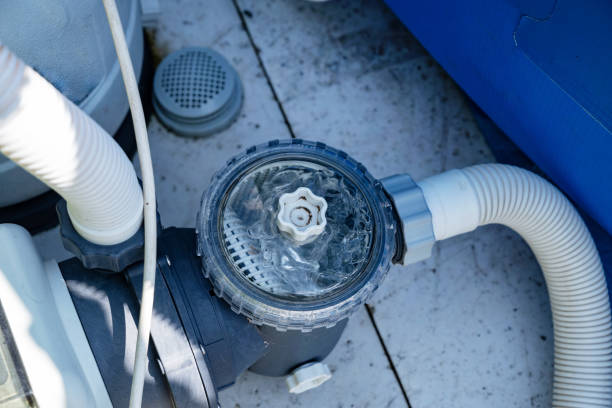If you’ve ever turned on your tap and noticed cloudy water, an odd smell, or a metallic taste, you might have wondered: Is my water safe? For homeowners using well water, these concerns can be even more pressing, as untreated well water often comes with specific challenges. Enter the whole house water filter, a versatile and effective solution for ensuring clean, safe water throughout your home. In this guide, we’ll dive into what whole house water filters are, how they work, and how they can pair perfectly with a well water treatment system to tackle common water issues.
What Is a Whole House Water Filter?
A whole house water filter is a filtration system installed at the main water line of your home. This means every faucet, shower, and appliance receives filtered water. Unlike point-of-use filters like those you attach to a single faucet or keep in your fridge, a whole house water filter treats all the water entering your home. Whether you’re washing dishes, taking a shower, or drinking a glass of water, you benefit from cleaner, healthier water.
How Do Whole House Water Filters Work?
Whole house water filters typically operate using a multi-stage filtration process. While the exact setup can vary, most systems include the following:
Pre-filtration: Captures large particles like dirt, rust, and sediment, which is particularly important for well water that often carries debris.
Activated carbon: Removes chlorine, pesticides, and organic chemicals that can cause unpleasant odors and tastes.
Specialty filters: Depending on your water needs, these might target contaminants like iron, manganese, or even bacteria and viruses.
Post-filtration: Polishes the water to ensure it’s as clean and clear as possible.
Pairing a whole house water filter with a well water treatment system can enhance its effectiveness. For example, if your well water has high iron levels, installing an iron removal filter alongside your primary system can prevent stains and prolong the life of your plumbing.
Why Are Whole House Water Filters Important for Well Water?
Well water often comes with its own unique set of challenges, such as:
Sediment: Dirt and debris can clog plumbing and damage appliances over time.
Iron and manganese: These minerals can leave orange or black stains on fixtures and laundry.
Hard water: High levels of calcium and magnesium can cause scale buildup in pipes and water heaters.
Contaminants: Well water may contain bacteria, viruses, or agricultural runoff.
A whole house water filter tailored to well water treatment can address these issues comprehensively. This means fewer maintenance headaches, longer-lasting appliances, and better-tasting water for your family.
How to Choose the Right Whole House Water Filter for Your Home
Selecting the right system can feel overwhelming, but it doesn’t have to be! Here are some tips to simplify the process:
Test your water: Start with a water test to understand the specific contaminants in your well water. Knowing what’s in your water will help you choose a system tailored to your needs.
Consider flow rate: Make sure the filter can handle the water demand of your household. Larger families or homes with multiple bathrooms may need a system with a higher flow rate.
Look for certifications: Systems certified by reputable organizations like NSF International are tested for performance and safety.
Think about maintenance: Some systems require regular filter changes, while others may need more specialized upkeep. Choose one that fits your lifestyle.
By following these tips, you’ll find a whole house water filter that works seamlessly with your well water treatment system, giving you peace of mind.
Where Can You Install a Whole House Water Filter?
Whole house water filters are usually installed where your main water line enters your home. This location ensures all water—from the kitchen sink to the washing machine—is filtered. For well water users, it’s especially common to install the filter system near the pressure tank. This setup allows the filter to tackle sediment and other contaminants before the water flows to the rest of the house.
Hiring a professional plumber for installation is often a good idea. They can ensure the system is installed correctly and check that it integrates properly with your well water treatment system.
Benefits of Using Whole House Water Filters
Choosing a whole house water filter, particularly when paired with a well water treatment system, comes with several benefits:
Better-tasting water: Remove unpleasant odors and tastes caused by sulfur, chlorine, or organic matter.
Healthier living: Reduce harmful contaminants, ensuring your family has safe water for drinking and cooking.
Protects appliances: Filtered water reduces wear and tear on appliances like dishwashers and washing machines.
Fewer plumbing issues: Minimize scale buildup and pipe corrosion.
Eco-friendly: Say goodbye to bottled water and reduce plastic waste.
Key Maintenance Tips for Your Whole House Water Filter
To get the most out of your system, keep these maintenance tips in mind:
Regularly replace filters: Check the manufacturer’s recommendations for filter changes. Overused filters can reduce water flow and effectiveness.
Flush the system: Periodically flushing the system can prevent clogs and ensure optimal performance.
Inspect for leaks: After installation or filter changes, double-check for any leaks to avoid water damage.
With proper care, your whole house water filter can provide years of reliable service, making it a worthwhile investment for any home—especially those using well water.
Conclusion
If you’re tired of dealing with cloudy, foul-smelling water or scrubbing away stubborn stains caused by your well water, a whole house water filter could be the solution you need. Not only does it ensure every tap in your home delivers clean, great-tasting water, but it also protects your appliances and plumbing. When paired with a well water treatment system, you can tackle even the toughest water challenges, ensuring a healthier, happier home for your family.




